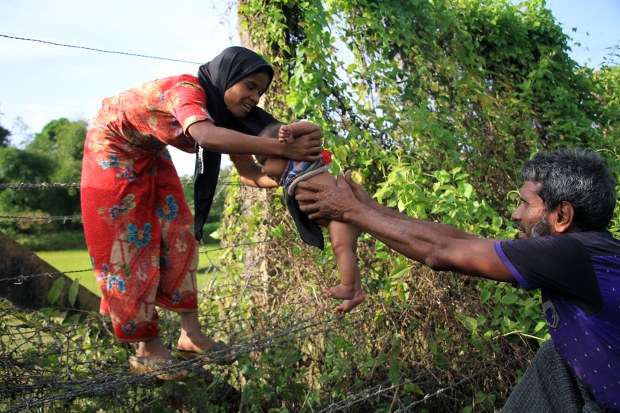Bangladesh Proposes to Help Myanmar Battle Rohingya Militants
2017.08.28
Dhaka and Cox’s Bazar, Bangladesh
 A Rohingya man passes a child through a barbed wire border fence near Maungdaw on the border with Bangladesh, where thousands have fled from Myanmar Army operations, Aug. 28, 2017.
A Rohingya man passes a child through a barbed wire border fence near Maungdaw on the border with Bangladesh, where thousands have fled from Myanmar Army operations, Aug. 28, 2017.
Bangladesh on Monday proposed to Myanmar that the two neighboring countries launch joint military operations against Rohingya militants whose attacks on dozens of police outposts in Myanmar’s northwestern Rakhine state have led to a new wave of refugees across the border.
A senior Bangladesh official extended the offer during a meeting with Aung Myint, the chargé d’affaires of Myanmar’s Embassy in Dhaka, who was summoned to the foreign ministry twice over the last three days in protest over the influx of Rohingyas fleeing the violence in Rakhine state.
Manjurul Karim Khan Chowdhury, director general in charge of the Southeast Asia desk at the Bangladesh foreign ministry, told BenarNews that he had also conveyed Dhaka’s protest against the Myanmar government’s use of the term “Bengali” to describe the Rohingya – considered a derogatory term implying they were interlopers from Bangladesh.
"Today (Monday), we summoned the CDA again, and made a proposal,” he said. “We proposed launching a joint military operation against the militant groups and terrorists in the frontiers.”
Chowdhury said the offer was aimed at convincing Myanmar to mount a targeted operation against militants instead of taking what he called indiscriminate actions that affected the unarmed civilian population in Rakhine.
"If the joint operation is conducted, the terrorists and militants would not be able to flee crossing the border," he said.
He said the Myanmar diplomat informed him that he would send the proposal to his government.
The latest violence triggered by coordinated attacks on dozens of police posts in Rakhine state has killed at least 100 people, according to AFP, and forced thousands of villagers to flee.
"As of 27 August, an estimated 5,200 people were reported to have crossed the border into Cox’s Bazar, since 24 August, following violence in Myanmar," the U.N. Office for the Coordination of Humanitarian Affairs (OCHA) said via its information service, ReliefWeb.
Thousands more are believed to be gathered on the border, and have been appealing to the Bangladesh authorities to allow them to enter, OCHA said.
In a statement Monday, a spokesman for U.N. Secretary General Antonio Guterres said he was “deeply concerned at the reports of civilians being killed during security operations in Myanmar’s Rakhine State.”
He urged Myanmar to implement recommendations in a report submitted last week by a commission headed by former U.N. chief Kofi Annan on resolving the conflict in Rakhine state, and said Bangladesh should allow Rohingya fleeing violence to seek safety on its soil.
Sent back
Lt. Col. SM Ariful Islam, commander of the Border Guard Bangladesh in Teknaf, told BenarNews that his forces had captured 475 Rohingyas as they tried to cross into Bangladesh territory on Monday evening.
“They have been sent to Myanmar after providing humanitarian assistance,” he said.
The Arakan Rohingya Salvation Army (ARSA) took responsibility for the border post attacks on, claiming via Twitter that they amounted to “defensive action” against persecution of Rohingya Muslims by Myanmar government forces.
“I strongly condemn today’s brutal attacks by terrorists on security forces in Rakhine State,” State Counselor Aung San Suu Kyi, Myanmar’s de facto leader, said in a statement Friday.
ARSA, formerly called Harakah al-Yaqin (Faith Movement), is also believed to have carried out attacks on three border guard posts that killed nine officers on Oct. 9, 2016. It claims to lead an ongoing insurgency movement in northern Rakhine’s Mayu mountain range.
ARSA chief Ata Ullah said in a 19-minute video uploaded to YouTube earlier this month that the group's "primary objective" is to "liberate our people from dehumanized oppression perpetrated by all successive Burmese regimes.”
During a meeting Saturday, Chowdhury said, the foreign ministry also protested the Myanmar government’s use of the term “Bengalis” to describe the Rohingya, and said this breached the terms of a 2014 agreement in which Bangladesh also agreed to stop using the word “Rohingya.”
An estimated 1.1 million Rohingyas, who have no citizenship rights, live in Myanmar’s western Rakhine State, where up to 78 percent of people live in poverty, according to the World Bank.
"Bangladesh categorically informed Myanmar that they should not carry out operations against unarmed civilians," another foreign ministry official, who requested anonymity, told BenarNews.
“We support the military operations against the terrorists and militants,” he said. “But we can in no way support casualty of the civilian population.”
‘We are not jihadists’
In an interview with Asia Times, an ARSA spokesman identified as Abdullah, said the group’s lethal rebellion was strictly homegrown and not backed by international terror groups.
“We are not jihadists,” he said. “This is clear from ARSA’s modus operandi, the way it operates and is run, and the direction it’s moving in. None of this is in line with the goals of Pakistani or other jihadist groups. We are actually much more like any other (ethnic) armed group in Myanmar.
“As long as our demands are not met, resistance will continue and, if unfulfilled, those demands will be upgraded to another level,” he said, without elaborating on what “another level” might involve.
The interview occurred a day after the militant attacks that killed 59 insurgents and 12 security forces on Friday, Asia Times said.







